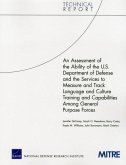Concerned about U.S. Department of Defense contracts for private-sector services, Congress mandated development of an inventory of contract activities. RAND conducted a review of the system, stakeholder needs, and alternative data sources.
Hinweis: Dieser Artikel kann nur an eine deutsche Lieferadresse ausgeliefert werden.
Hinweis: Dieser Artikel kann nur an eine deutsche Lieferadresse ausgeliefert werden.








